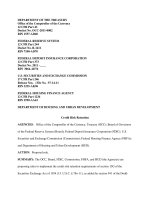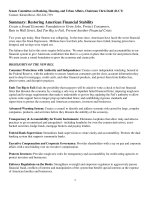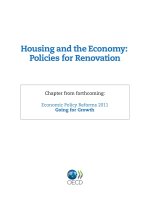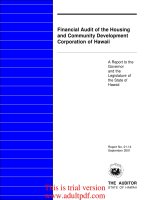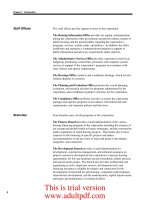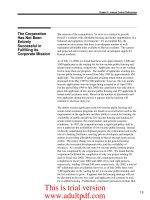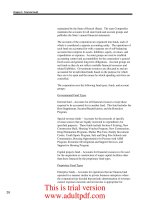Housing and accommodation
Bạn đang xem bản rút gọn của tài liệu. Xem và tải ngay bản đầy đủ của tài liệu tại đây (58.63 KB, 10 trang )
Fill in the gaps in this text with appropriate words, and write these in the crossword grid on
the next page. The first and last letters of each word have been given to you, and these are
followed by the location of that word in the crossword grid (for example, 1 ı = 1 across,
13 ij = 13 down, etc). Where two words are needed, there will be no gap between them
in the grid.
22
Housing and accommodation
About 66% of the UK population own or are buying their own home. The rest live in accommodation that
they r________t (2 ij).
Most people buy their property using a m________e (23 ij), a special kind of loan specifically for buying
property, available from banks or b_______g ________s (14
ı
). On average, these are paid back over 25
years. It is important that you are able to pay this money regularly, otherwise you risk losing your property
to the lender.
Most property in the UK is sold through an e________e a________y (15 ij) which can be found on most
high streets. If a property is for sale and you are interested in buying it, you will need to make an
a________t (16
ı
) to v________w (12
ı
) it. If the price of a property is too high for you, it is considered
acceptable to make a lower o________r (3 ij) to the seller. When you indicate that you want to buy a
property, it is important that your offer is 'subject to c________t (27
ı
)', which means that you can
w________w (17 ij) from the sale for any reason before any papers are signed.
When buying a property, you should always employ the services of a good s________r (22 ij) to carry out
a thorough s________y (1
ı
) (to make sure that the property is in good condition, and that no r________s
(8
ı
) need to be made). It is also essential that you employ the services of a good s________r (10
ı
), who
will carry out various legal c________s (26 ij) on the property.
Accommodation can be rented from a local a________y (18 ij) (such as your local council). You will need
to get your name on a w________g (24
ı
) list known as a housing r________r (9 ij). This housing is
allocated on a p________y (21
ı
) basis: people with the greatest needs are a________d (25 ij) housing
before anyone else (for example, people with young children, women who are expecting a baby, etc).
Accommodation can also be rented from housing a________s (13 ij). These are i________t (11 ij)
organisations that provide accommodation for people who need it. They do not make a p________t (28
ı
).
Many offer shared-o________p (19
ı
) schemes for people who want to own property but who cannot
afford it.
A lot of property is privately owned and rented out by l________s (32
ı
). They often run their property
through a l________g (20
ı
) agency, but many advertise their property themselves in newspapers. If you
rent accommodation this way, you will be expected to sign a contract known as a l________e (33
ı
) (also
called a t________y (6
ı
) agreement). In most cases, you will be expected to pay a d________t (4 ij)
(usually one month's rent, which you should get back when you leave the property, provided the property
and everything in it is in good condition). Rent is then normally paid monthly in a________e (7
ı
), which
means that you pay for each month you are there at the beginning of that month.
Before you agree to move into rented accommodation, you should always check a few important points:
whether the accommodation is f________d (29 ij) (are there beds, sofas, etc already in the property?),
how long the t________y (6
ı
again) lasts (most are for six months, with an option to extend at the end of
that period), and whether or not there are any special rules (for example, many landlords specify that you
cannot smoke in their property, or that you cannot have pets). If you break these rules, you could be
e________d (34 ij) (told to leave the property).
Note that the person living in rented accommodation (the t________t (5 ij again)) cannot be forced out of
their home without being given sufficient n________e (31
ı
) (a written note that they must leave the
property). Also note that landlords cannot d________e (35
ı
) against someone because of their sex, race,
religion, etc (in other words, it is illegal to refuse someone accommodation on these grounds).
People who are unemployed or on a low income could be entitled to receive housing b________t (30 ij). This
is money which is paid by the local authority to cover all or part of the rent.
23
1 2
3 4
5 6
7
8
9
10 11 12
13
14 15
16
17 18
19
20
21 22
23
24 25 26 27
28 29 30
31
32
33 34
35
How much do you know about law and the police in the UK? Test your knowledge with this
quiz.
24
Legal matters 1
1. Who is responsible for setting the general standards and priorities of the police in the United
Kingdom? Is it:
(a) The Prime Minister (b) The Home Secretary (c) Local judges (d) The Lord Chancellor
(e) The monarch
2. Complete this sentence with one word:
There are 43 police __________ in England and Wales, eight in Scotland, and one in Northern
Ireland.
3. Do police in the United Kingdom carry guns?
4. What telephone number should you call if you witness a crime, or if you are involved in a crime?
5. Can you report a crime using email?
6. Is it an offence for a member of the public to carry (a) a gun, and ((b) a knife in a public place?
7. The police have three main roles. Complete this paragraph with appropriate words. The first and last
letter of each word have been given to you:
The police must protect l__________e and p__________y (houses, shops, factories, cars, possessions,
etc). They are also required to prevent d__________s (such as fighting in the street, hooliganism,
people playing very loud music at night, etc). At the same time, they must prevent and detect
c__________e.
8. If you suffer or witness police misconduct, can you do anything about it?
9. Can the police stop you in the street or in your vehicle at any time, and search you / your vehicle?
10. If you are stopped by the police, what information should you give them? Choose from the
following options.
(a) Your name (b) Your age (c) Your job (d) Your nationality (e) Your passport or ID number
(f) Your address or place of residence (g) What you are doing (h) Where you are going
11. In return, what information can you ask from them?
12. What would happen to you if you were rude to a police officer?
13. Complete this paragraph with appropriate words. The first and last letter of each word have been
given to you:
If the police want to enter and search a building, they need a w__________t, which they obtain
from a local m__________e. They do not need one of these if they need to get into a building to
a__________t someone, to s__________e someone's life, or to prevent d__________e or
d__________e.
14. Now do the same with this paragraph:
If the police arrest you, they must give you a reason, and then c__________n you (in other words,
they officially warn you that anything you say may be used as e__________e against you). If you
have problems understanding English, they should provide an i__________r. You have some rights,
including the right to see a s__________r (free of charge: each police station should have access to a
d__________y s__________r, who advises people who have been arrested), the right to send a
m__________e to someone to let them know where you are, and the right to look at the police
codes of p__________e (a list of guidelines that the police must follow).
15. If you are a victim of crime, can you get compensation?
Exercise 1
:
Complete definitions 1 – 30 with words / expressions from the box. Note that several of
these are related to English and Welsh law only.
Legal matters 2
25
½ barrister ½ employment tribunal ½ magistrate
½ Citizens' Advice ½ European Court of Human Rights ½ Magistrates' Court
½ coroner's court ½ European Court of Justice ½ No win, no fee
½ coroner ½ High Court ½ rent tribunal
½ County Court ½ House of Lords ½ sentence
½ Court of Appeal ½ judge ½ small claims court
½ Crown Court ½ Jury ½ solicitor
½ CPS ½ jury service ½ suspect
½ defendant ½ lawyer ½ witness
½ dispute ½ legal aid ½ youth court
1. A __________ is a court that deals with arguments over small amounts of money (usually less than
£5000).
2. A __________ is a civil or criminal court to which a person may go to ask for an award or sentence
to be changed.
3. A __________ is the general name for anyone who is qualified to provide people with legal advice
and services.
4. A __________ is someone who sees a crime take place.
5. A __________ is one of the types of court in England and Wales which hears local civil cases.
6. The __________ is a court which considers the rights of citizens of states which are parties to the
European Convention for the Protection of Human Rights.
7. An __________ is a body responsible for hearing work-related complaints.
8. A __________ is a court in England and Wales where minor crimes are judged. It can also commit
someone for trial or sentencing in a Crown Court.
9. A __________ is a judge in number 8 above, and also in number 25 below.
10. __________ is an organisation that gives people free advice on legal, financial and social
problems.
11. A __________ is a court above the level of a Magistrates' court which hears criminal cases.
12. A __________ is a group of people (usually 12 ordinary members of public) who judge a court case
in a Crown Court.
13. __________ is the obligation to be part of number 12 above, and can be done by anyone whose
name is on the electoral register.
14. A __________ is a court which decides in disputes about money paid or services provided in return
for leasing something – usually buildings or land.
15. The __________ is the main civil court in England and Wales.
16. The __________ is the court set up to see that the principles of law as laid out in the Treaty of Rome
are observed and applied correctly in the European Union.
17. A __________ is a lawyer who gives legal advice, writes legal contracts, and represents people in the
lower courts of law (for example, in a Magistrates' Court or County Court).
18. '__________' refers to cases in which the person in number 17 above only charges his / her client if
they win their case.
19. A __________ is a lawyer in England or Wales who is allowed to speak in the higher law courts (for
example, in the Crown Court).
Exercise 2:
Complete these sentences with the most appropriate word or words from exercise 1.
26
20. The __________ is the highest court of appeal in the United Kingdom (although anyone who is
unhappy with a decision made here can appeal to the European Court of Justice).
21. A __________ is a court presided over by a public official (usually a doctor or lawyer) who
investigates sudden, unexpected and violent deaths.
22. A __________ is someone who hears a case and makes decisions in number 21 above.
23. A __________ is someone who makes decisions in a court of law (for example, in a Crown Court, he
/ she may send someone to prison).
24. The __________ is the official organisation in England and Wales that decides whether the police
have found enough evidence to have a court case against someone.
25. A __________ is a special type of court for people under 18 who have been accused of doing
something wrong.
26. A __________ is someone who the police believe may have committed a crime (it can also be a verb:
to __________ someone of something).
27. A __________ is a punishment given by a judge, usually involving a period of time that must be
spent in prison. (it can also be a verb: to __________ someone to five years in prison).
28. A __________ is someone who has been accused of a crime and is on trial.
29. __________ is a system in which the government pays for people to get advice about the law or be
represented in court when they do not have enough money for this.
30. A __________ is a disagreement or arguments between parties.
1. Mr Johnson and Mrs Johnson are getting divorced. Mrs Johnson demands to have the house, the car
and 75% of Mr Johnson's life savings. Mr Johnson disagrees. Their case is taken up by their
__________, and eventually goes to a __________ for judgement.
2. Five workers have been sacked from the energy company Dilligas. They believe that they have been
unfairly dismissed, and so after getting advice from their local __________, they take their case to a /
an __________.
3. Mr and Mrs Waugh had a new window installed in their house. The window company now wants
the Waughs to pay, but Mr Waugh is refusing because he thinks the quality of workmanship is poor.
The company takes them to the __________ to get their money.
4. Jamie Yarnton pays £500 a month to live in a house that belongs to Mrs Cassington. Suddenly, Mrs
Cassington asks him for £1000 a month instead. Mr Yarnton thinks this is completely unreasonable.
He hopes that a __________ will decide in his favour.
5. A national newspaper accuses the Prime Minister of stealing money from his own party. The PM
accuses the newspaper of telling lies. The __________ is taken to the __________, where the
newspaper is ordered to pay £85,000 in damages to the PM. The newspaper thinks this is unfair,
and goes to a __________ to try to reduce the amount they need to pay.
6. Laurence Bailey robs a bank. The day after he is arrested, he appears in a __________ for an initial
hearing. The __________ tells Mr Bailey that he will have to appear for trial in a __________.
Although he hires a good __________ to represent him in court, the __________ find him guilty. The
__________ decides he must be punished, and __________ him to eight years in prison.


